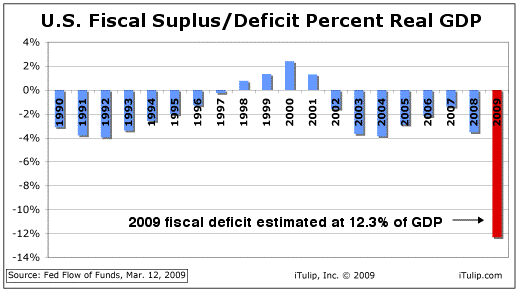
Pranab Mukherjee, finance minister of India presented what many believed to be a lousy budget with no definitive approach towards important issues like disinvestment, financial sector reforms and even deregulation of petrol and diesel prices. The argument in favour of FM was that budget is not neccesarily the place to chalk out plans for reforms or disinvestment strategy. These market-centered announcements may even come later through the course of the Congress's regime. Point well taken.
But, the most dreaded and the one which could come back to haunt the FM and the people is the fiscal deficit. The projected fiscal deficit for this financial year is 6.8% and when you add the state fiscal deficit which is 3.8% and some revised expenditure through the year, it ballons out to nearly12.5-13% and more worrisome is the revenue deficit at 3%. Revenue deficit is the deficit caused by higher cost of running government, its debt and things like pay commision hikes. According to FRBM act(Fiscal Responsibility and Budget Management), the union government has financial obligation to keep the fiscal deficit below the accepted levels of 3-4%. But these are tough and unprecedented times. A deeper economic recession and the resultant negative growth of the private sector has left the central government with little headroom for spuring economic growth or atleast maintain it at present levels. That is precisely why the government has announced three stimulus packages. Stimulus packages are essentially more spending by the government in job-oriented infrastruture projects, farm loan waivers, tax cuts, interest rate deduction and giving more subsidies. The idea is to put more money in the common man's pocket and encouraging him to spend more. This in turn will spur growth due to domestic demand. At a time, when export market is hit by a deep recession in developed countries(US and Europe in particular), fiscal stimulus are the only way the government can arrest the economic growth from nose diving.
But, everything comes at a cost. These stimulus packages need greater government spending and so the government borrows money from the central banks(like the RBI) and many foreign financial instituitions.Also, at a time of recession, due to less industrial growth, the tax collections from both the corporate and individuals citizens are comparitively lesser. So, this is the cause of balloning fiscal deficit and what does it have to do with ordinary citizen like you and me?
As fiscal deficit increases and the government borrowing from RBI hits new high, interest rates increases which will crowd out the private sector from large scale investment. Cascading effect is more job losses, less spending and low growth. Also, high fiscal deficit will force international credit rating agencies like S&P, IMF to downgrade India credit rating. This only adds to more pain as these are the main criterion with which foreign financial institution plan investment and lend credit to Indian MNC's.
So, its very vital to contain the Fiscal deficit and get the country back to normal growth. Many other countries like America and UK have high fiscal deficit in tune to about 15% and 9% respectively. But they have far deeper crisis than what we do. We have to be careful so that we don't fall into a painstaking downturn like the developed countries. This is perhaps why, the markets nosedived nearly 10% last week, the fact that there was no proper roadmap to contain and bring back the fiscal deficit to acceptable levels(maybe 3-4%).The FM did say that the fiscal deficit will come down to 4% by FY 2012. But there was no mention of any plan how he will bring them down.
This is such a risky and tough period which may well decide whether we get back to sub-8% growth rates or languish to a paltry sub-4% levels which will disastrous for the whole nation, you and me included. Hope Finance Minister's listening.....